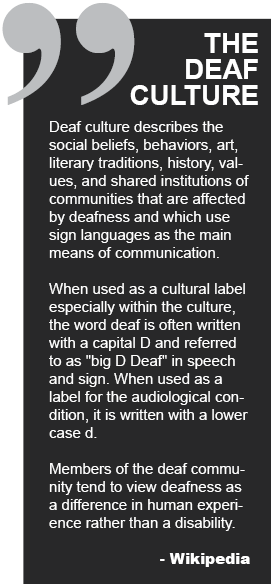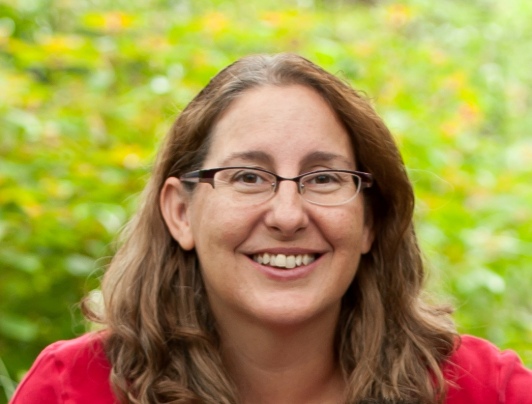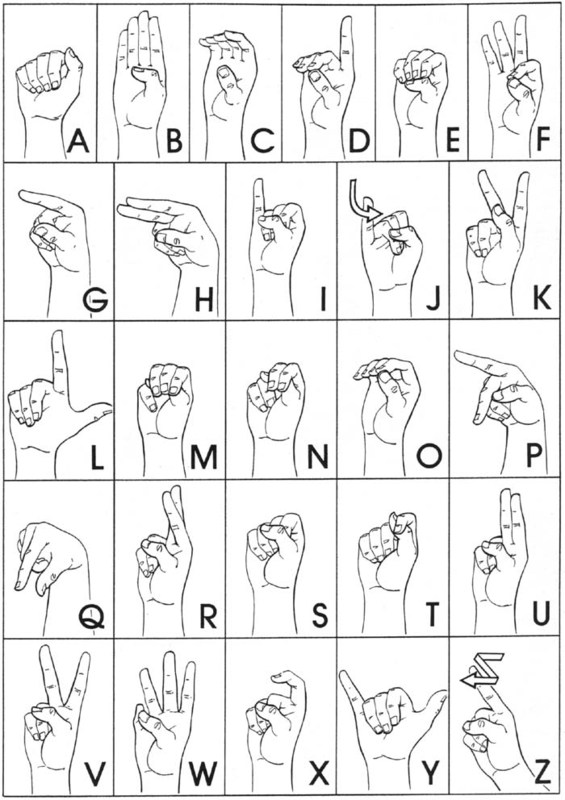 Michele Westfall was born without hearing. So were her two sons. ITM talked to her about life, sounds and the Deaf culture.
Michele Westfall was born without hearing. So were her two sons. ITM talked to her about life, sounds and the Deaf culture.
The Deaf culture includes communities affected by deafness, and it’s a natural part of the life of Michele Westfall and her two kids, 8 and 5 years old. In their household ASL – American Sign Language – is the language used to communicate in, and life without sound is no obstacle.
But what’s it really like to never have heard anything, and what is the Deaf culture that seems to be close at heart to Michele and her family?
Interviews That Matter: Do you have any form of perception of what some things might sound like, even if the believed sound is just made up in your mind?
Michele Westfall: Not really. Since I was born deaf, I don’t have the proper frame of reference to know what this or that sound is supposed to sound like. Any sound I hear would be interpreted as “noise” to me.
ITM: But isn’t noise a form of sound too? Do you mean that it would be something annoying to you, or what does “noise” sound like?
MW: You’re right. It’s more like gibberish that doesn’t make sense to me. That’s the best way I can put it. It’s gibberish that I cannot use or do anything with, so its usefulness is nil.
ITM: Can you hear yourself thinking?
MW: No. But I can see and feel myself thinking.
ITM: Can you elaborate?
MW: I’ve been a visual being since birth. I don’t hear a voice in my head when I think. When I think, I see ASL signs in my head. Sometimes I see images or words. In other words, my “voice” is visual, not sound-based.
ITM: Are there some sounds that you would really like to know what they’re like?
MW: Not really. I don’t go around thinking or wishing I was hearing. I’m happy and comfortable with who I am.
When I think, I see ASL signs in my head.
ITM: What aspects of everyday life are different for you compared to life for the rest of us?
MW: I don’t own any radio or sound equipment such as stereo. All of the television sets in my house have the caption feature permanently turned on. The fire alarm in my house is a visual type. It will flash a strobe-like light if there’s a fire.
Everyone in my house is deaf and speaks ASL. Other than that, we live like the “rest of you” do. We cook, we clean, we play, we argue, we talk, and go about our daily lives like y’all do.
ITM: Now I feel embarrassed for differentiating “you” and “the rest of us”. Do people often label or judge you?
MW: It’s human nature to label, categorize, and judge. The danger is when people use labels, categories, or judgments to discriminate against certain people or to oppress certain people.
My culture and my language are often disrespected or disregarded daily. That has to stop because it’s wrong. They have existed for centuries, and I would like to be able to enjoy my life instead of spending my time and my energy defending my culture and my language. Deaf people have better things to do with our time, you know.

ITM: You have two deaf kids. Is it genetic?
MW: Yes, it’s genetic for us. My kids and I have a recessive gene called connexin-26. We were born deaf, and we regard it in the same manner anyone would regard being born a blonde or being born brown-eyed. It’s just who we are and is a part of our identity.
Just so you know, there are 300-plus deaf-related genes, so it’s clear to me that we are meant to be here. I know some Deaf people who come from multi-generational Deaf lineage. We’re the “first generation” Deaf in our family.
ITM: What was it like when you grew up? Is it harder or easier for your kids?
MW: I was lucky. My parents are hearing, but they were advised to learn sign language and to send me to a school for the deaf. I had a great childhood because I was able to grow up with other Deaf children. I could talk with them, play with them, argue with them, and be on equal terms with them. I was part of the Deaf community – and still am.
I was able to participate in school activities such as acting in school plays, being editor of the school yearbook, and serving on the school student body government. I wasn’t seen as “different”.
In some ways my kids have it easier, because their parents are Deaf and native ASL speakers. From the start, they were celebrated as Deaf beings, since we were not sad that they were Deaf. We did not spend any time grieving or adjusting. We were able to focus on raising them and fully enjoy the process of seeing their development as Deaf beings.
ITM: Did it still come as a surprise, or did you know before they were born?
MW: Being culturally Deaf, we of course hoped for Deaf children. The day after giving birth to my older son, I noticed that he was the only baby in the hospital nursery who didn’t cry. All other babies were crying their heads off, but not my son. I knew at that moment he had to be Deaf and we were delighted.
Approximately a year later, we had our DNA’s checked, and we learned we had the connexin-26 gene, which meant that no matter how many times we got pregnant, we would always have Deaf children.
I come from a hearing family, and my ex only had three distant Deaf cousins, so we thought our chances of having Deaf children were something like a million to one.
I don’t own any radio or sound equipment.
ITM: Have you ever had to tell your kids to quiet down?
MW: Sure. I have hearing neighbors, after all.
ITM: How about to listen up, or to be louder?
MW: My kids are chatterboxes who ply me with questions and comments in ASL constantly, so they’re “loud” enough as it is. As for listening up…well, when they don’t get their way, they pout and close their eyes or turn their head away. The minute they close their eyes or turn their head away, they stop “listening”.
I simply tap them on their shoulder to get their attention and they know that’s when they have to listen to their Mom!
ITM: There’s a famous and quite emotional Youtube clip of a grown woman who, with the help of a machine, hears her husband for the first time. If it was possible for you, would you have liked to do the same to be able to hear your kids?
MW: No. Keep in mind, just hearing a sound is not the same as having full understanding of what it is. The grown woman in the Youtube clip heard her husband, yes. But does it mean that she would then suddenly become a full-fledged “hearing” person? No. That’s not going to happen. It doesn’t work that way.
It would send my children a clear message that I was not comfortable with myself.
The reality never lives up to the hype, and is not worth doing. Additionally, as a Deaf person who views myself as a culturally Deaf person, what message does it say to my children if I were to do this? It would send my children a clear message that I was not comfortable with myself as a Deaf person and that “being hearing is better”, when both messages are untrue.
I want my children to be comfortable with themselves and that’s the most important gift or message I can convey to them. I wouldn’t ever want them to feel that they had to change themselves just for the sake of meeting the standards of a non-deaf society.
ITM: How do people react when they realize you can’t hear them?
MW: I don’t hide who I am, so people know right away that I’m deaf. Most of them have been cool about it. That’s the majority of the curve, but as with any curve, there are extremes.
I once got on an elevator and there was this good-looking hearing guy standing next to me. He said something to me and I couldn’t understand him. I told him in ASL that I was Deaf, and his expression immediately changed. He then started to move away from me, as far as he could, within the confines of the elevator. I had to fight an urge to touch him and tell him that it was “catching”, as a joke.
Another example: My children and I once went into a restaurant in South Carolina and we were taken to our table. When our waiter came to take our order, we pointed to various items on the menu and he seemed to understand what we wanted. Our order came, and we realized the waiter had gotten it all wrong. It wasn’t even close.
We tried again to tell him what we wanted, and we realized that our waiter’s brain had frozen so completely that he couldn’t process what we were telling him. He had that deer-in-the-headlights look. We eventually gave up and ate our second order, which was also wrong.
Fortunately, we don’t run into these types of extremes that often.
ITM: It must be bizarre for you finding yourself in those situations. How should people handle meeting a deaf person? Any advice for them?
MW: It’s nothing to get all worked up about. Just stay cool and use paper and pen or text with your smart phone. If you happen to know some sign language, great. Using it will improve your fluency, and most Deaf people are usually happy to help you practice what you know.
ITM: Any advice for parents of deaf children?
MW: First of all, let me offer you congratulations on having your Deaf child! There is no need to be sad, upset, or to grieve. It’s not a tragedy. You’ve been given a unique opportunity to have access to a visual society populated by visual beings. Your Deaf child is a visual being and needs to have visual access to language in order to acquire a language.
To paraphrase a famous quote, if you expect a fish to ride a bicycle, it will grow up thinking it’s stupid. Don’t do that to your Deaf child. Start learning sign language and speak it with your child at all times. Make sure the entire family learns sign language, and seek Deaf role models or establish relationships with Deaf adults, as they’re the experts.

Thank you Michele!
Sent from my iPhone

No comments:
Post a Comment